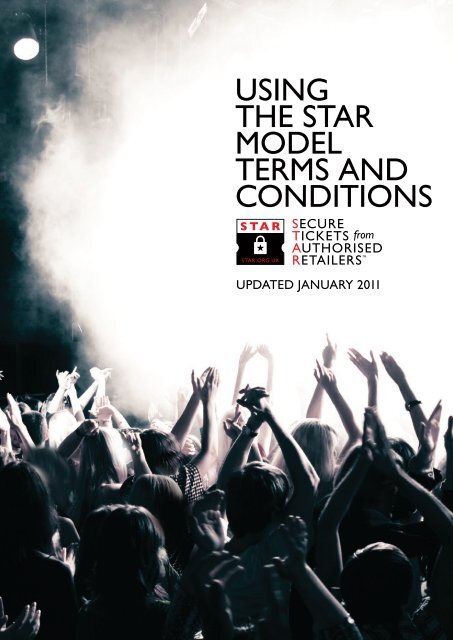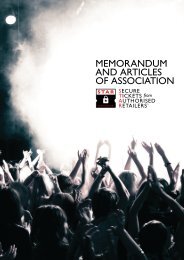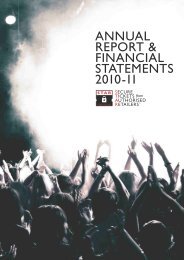USING THE STAR MODEL TERMS AND CONDITIONS
USING THE STAR MODEL TERMS AND CONDITIONS
USING THE STAR MODEL TERMS AND CONDITIONS
Create successful ePaper yourself
Turn your PDF publications into a flip-book with our unique Google optimized e-Paper software.
<strong>USING</strong><br />
<strong>THE</strong> <strong>STAR</strong><br />
<strong>MODEL</strong><br />
<strong>TERMS</strong> <strong>AND</strong><br />
<strong>CONDITIONS</strong><br />
UPDATED JANUARY 2011
BACKGROUND<br />
Shortly before the publication of its Market Study of<br />
Ticket Agents in January 2005, the Office of Fair Trading<br />
contacted <strong>STAR</strong> with the suggestion that it draft Model<br />
Terms and Conditions of sale for use by <strong>STAR</strong> members.<br />
The OFT noted in its report that in spite of the OFT’s<br />
publication of specific Guidance on Unfair Terms in<br />
Consumer Entertainment Contracts published in<br />
December 2004, some ticket agents, including <strong>STAR</strong><br />
members, were continuing to use terms that the OFT<br />
considered unfair.<br />
The OFT Market Study said that “experience shows that<br />
the creation by trade associations of model terms for<br />
their members’ consumer contracts is an effective and<br />
efficient way to improve standards in a large number<br />
of contracts, and can raise standards across a sector as<br />
a whole….We therefore recommend that the Society<br />
of Ticket Agents and Retailers (<strong>STAR</strong>) produce model<br />
terms for its members. We are happy to work with the<br />
<strong>STAR</strong> in producing these terms”.<br />
<strong>STAR</strong> responded positively to this suggestion and the<br />
<strong>STAR</strong> Council met with representatives of the OFT<br />
Contract Regulation Unit after which a cross-industry<br />
working group was put together to work on drafting the<br />
model terms.<br />
The draft terms went through various stages of legal<br />
scrutiny from within the working group, by other<br />
lawyers engaged to offer an independent opinion<br />
and through considerable consultation across the<br />
entertainment industry over a number of years. The<br />
OFT has agreed the terms as being fair to the limited<br />
extent that they are able to do so without the terms<br />
being tested in court. They have also agreed that they<br />
pass the necessary test of being written in plain English<br />
to help customers understand them.<br />
The model terms are not exhaustive and there will<br />
inevitably be some matters that need to be dealt with<br />
separately by ticket sellers. These model terms are<br />
simply intended to cover issues that are common to<br />
most events.<br />
Sellers using the model terms can add to them, preferably<br />
by way of an addendum to ensure that the core terms<br />
remain common amongst companies adopting them.<br />
Some terms, for instance the refund of per ticket booking<br />
fees for cancelled events, are immutable and core to the<br />
purpose of <strong>STAR</strong> and are also detailed in the <strong>STAR</strong> Code<br />
of Practice. It is imperative that any additional terms used<br />
by individual companies are also assessed by the seller for<br />
fairness within the relevant regulations and in separate<br />
consultation with the OFT if necessary. However, ticket<br />
sellers should remember that the model terms and<br />
conditions form the core of all trading terms and cannot<br />
be omitted or altered.
PRESENTING <strong>TERMS</strong> <strong>AND</strong><br />
<strong>CONDITIONS</strong> TO CUSTOMERS<br />
Terms and conditions cannot be binding unless a<br />
customer has fair access to them before making a<br />
purchase. Obviously 7 pages of A4 would be quite a lot<br />
to digest before completing a booking for tickets but<br />
they do, nevertheless, need to be made available.<br />
Some members are concerned about how customers<br />
can be presented with the terms andconditions, but<br />
we are all familiar with this process through other<br />
purchases we make and the process does not need to be<br />
excessively onerous.<br />
The OFT has previously stated the following:<br />
1 That they would expect <strong>STAR</strong> and its members to<br />
place the model terms on their respective websites.<br />
2 That for agreements to have been made in good faith,<br />
any terms and conditions (particularly the terms<br />
relating to refunds/exchanges, resale and liability)<br />
should be communicated to consumers at the outset,<br />
or prior to purchase consumers should be made<br />
aware of where to find the terms and conditions.<br />
The three main ways of booking and<br />
means of delivering the Ts&Cs are:<br />
In Person: Terms and conditions can be made<br />
available at the sales counter should customers wish<br />
to read them.<br />
Online: The simplest. Terms and conditions can<br />
be presented on a separate page with relevant links.<br />
Some companies also ask customers to check a box to<br />
indicate that they have read, understood and accepted<br />
the terms and conditions. The majority of customers<br />
probably just tick the boxes to proceed as quickly as<br />
possible. Customers could also be directed to the<br />
<strong>STAR</strong> website where the model terms are displayed<br />
(http://www.star.org.uk/media/4775/tc.pdf)<br />
By Phone: Some companies offer a full recitation<br />
of terms and conditions on their automated phone<br />
systems (interactive voice recognition - IVR). Customers<br />
could be made aware of where to find the full terms<br />
and conditions (website etc.) and given ‘highlights’ of<br />
important terms – for instance those relating to liability<br />
and refunds/exchanges.<br />
<strong>TERMS</strong> <strong>AND</strong> <strong>CONDITIONS</strong> ON TICKETS<br />
For years, ticket sellers have relied on terms and<br />
conditions printed on a ticket but as they are only<br />
presented to the customer after the sale has been<br />
completed, they are not binding and can only serve to<br />
reinforce knowledge and understanding of terms<br />
presented before the sale was completed. That<br />
reinforcement is certainly worthwhile but the importance<br />
of different terms may vary from seller to seller and it is<br />
therefore up to them to decide what to include.<br />
However, simply drawing attention to where the full<br />
terms and conditions can be read (online or by phoning<br />
for a copy to be sent?) may be sufficient.<br />
Wherever terms are abbreviated from the full terms, the<br />
sense of the original term should not be lost or altered.<br />
It is up to members to decide what terms they need to<br />
or wish to reiterate on their tickets, if any. There is no<br />
stipulation from <strong>STAR</strong> about what should be included.<br />
Example of terms printed on a ticket:<br />
From the full terms and conditions of sale<br />
(www.star.org.uk/media/4775/tc.pdf) we would<br />
like to draw your attention to the following:<br />
• Tickets cannot be exchanged or refunded<br />
after purchase unless the performance<br />
is cancelled or rescheduled or there is a<br />
material change to the programme or event.<br />
• Personal arrangements including travel,<br />
accommodation or hospitality relating<br />
to the Event which have been arranged<br />
by you are at your own risk.<br />
• It is your responsibility to check<br />
whether an event has been cancelled or<br />
rescheduled and the date and time of any<br />
re-scheduled event.<br />
• You may not re-sell or transfer a ticket if<br />
prohibited by law.<br />
• In circumstances where an Event is<br />
cancelled or rescheduled by the Venue<br />
or Promoter and refunds are to be given,<br />
the refund will equal the face value<br />
of the ticket plus any per ticket booking fee.<br />
• The management of the venue reserves<br />
the right to refuse ticket holders admission<br />
to the venue in reasonable circumstance,<br />
including for health and safety, licensing<br />
reasons or where a ticket is void.
DETAILS FOR MEMBERS<br />
TO DEFINE<br />
There are a few details which members will need to insert into the terms which are specific to your company:<br />
1) In Section 1 – the name of the member company should be inserted.<br />
2) Section 5 – you should include details about how tickets will be delivered as well is indicating the time before an<br />
event at which a customer should contact you if tickets have not been received.<br />
3) Section 10 – you should include details about how you retain and use details provided by customers. Obviously<br />
your policy on this should comply with relevant data protection regulations.<br />
FUR<strong>THE</strong>R INFORMATION<br />
ON UNFAIR <strong>TERMS</strong><br />
The Office of Fair Trading provides the following<br />
information about unfair terms. The relevant legislation<br />
is The Unfair Terms in Consumer Contracts Regulations<br />
1999 (UTCCRs):<br />
What is an unfair term?<br />
An unfair term in a contract covered by the UTCCRs<br />
is not binding on the consumer.<br />
Test of fairness<br />
A term is unfair if:<br />
contrary to the requirement of good faith it causes a<br />
significant imbalance in the parties' rights and obligations<br />
under the contract, to the detriment of consumers.<br />
'Good faith' means that you must deal fairly and<br />
openly with consumers. Standard terms may be<br />
drafted to protect commercial needs but must also<br />
take account of the interests and rights of consumers<br />
by going no further than is necessary to protect<br />
those legitimate commercial interests.<br />
The plain language requirement<br />
According to the UTCCRs, a standard term must be<br />
expressed in plain and intelligible language. A term is<br />
open to challenge if it could put the consumer at a<br />
disadvantage because he or she is not clear about its<br />
meaning - even if its meaning could be worked out by<br />
a lawyer. If there is doubt as to what a term means,<br />
themeaning most favourable to the consumer will apply.<br />
What terms are not covered?<br />
Most standard terms are covered by the UTCCRs.<br />
The exceptions are those:<br />
• that reflect provisions which by law have<br />
to be included in contracts<br />
• that have been individually negotiated<br />
• in contracts between businesses<br />
• in contracts between private individuals<br />
• in certain contracts that people do not make<br />
as consumers – eg, relating to employment or<br />
setting up a business<br />
• in contracts entered into before 1995<br />
Terms setting the price or<br />
defining the product or service<br />
Terms in consumer contracts which set the price or define<br />
the product or service being supplied are 'core terms' of<br />
the contract and are exempt from the test of fairness as<br />
long as they meet the plain language requirement.<br />
Links to More Information<br />
The Unfair Terms in Consumer Contracts Regulations<br />
1999 (UTCCRs) http://www.oft.gov.uk/advice_and_<br />
resources/resource_base/legal/unfair-terms/<br />
Guidance on unfair terms in consumer entertainment<br />
contracts http://www.oft.gov.uk/shared_oft/reports/<br />
unfair_contract_terms/oft667.pdf




